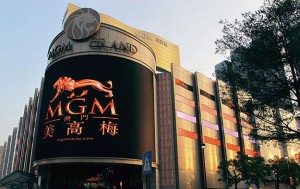So now we know where those The Mirage-is-for-sale rumors were coming from. Seems that the place really was not for sale, although  Phil Ruffin wished it was, to the tune of $1.3 billion. And, as badly as MGM Resorts International could use the cash to deleverage, CEO Jim Murren nixed Ruffin’s offer. It’s not the first time Murren has indicated it would take some super-lucrative offer (to the tune of 15X cash flow or so) to make him part ways with Steve Wynn‘s precedent-shattering megaresort.
Phil Ruffin wished it was, to the tune of $1.3 billion. And, as badly as MGM Resorts International could use the cash to deleverage, CEO Jim Murren nixed Ruffin’s offer. It’s not the first time Murren has indicated it would take some super-lucrative offer (to the tune of 15X cash flow or so) to make him part ways with Steve Wynn‘s precedent-shattering megaresort.
The deal would have made a lot of sense for Ruffin, whose Treasure Island is umbilically connected to The Mirage and could use the elbow room the latter’s 65 acres affords. On the upside, Ruffin says he’s almost broken even on Trump International, the condo tower being only $12 million in the hole at this point. Ruffin was being a veritable Chatty Cathy, also revealing that he’s the mystery buyer of Gary Primm‘s vast suburban estate, next door to his own. His plans for the sprawling compound are still up in the air, with a children’s park one option under consideration. “Somebody wanted to buy it and put houses on it,” he told Howard Stutz. “I wouldn’t allow that.”
* The Motley Fool‘s Travis Hoium looks at MGM’s REIT conversion and sees trouble: “Long-term, I think this new structure is only going to complicate the company’s business and create strain  when it wants to invest in new resorts … then MGM Resorts may wish it had stayed a single company that can do what it wants without negotiating with this new third party, which owns its buildings.” He also thinks it’s odd that a company with low tax billings — $835,000 in 2013 — would opt for a REIT, whose appeal is its tax-exempt status. MGM might be on the hook for a lot more but it keeps its MGM Macau profits stashed overseas.
when it wants to invest in new resorts … then MGM Resorts may wish it had stayed a single company that can do what it wants without negotiating with this new third party, which owns its buildings.” He also thinks it’s odd that a company with low tax billings — $835,000 in 2013 — would opt for a REIT, whose appeal is its tax-exempt status. MGM might be on the hook for a lot more but it keeps its MGM Macau profits stashed overseas.
Hoium opines that MGM may be seeking investors looking for a stable, long-term play. But he also notes that Penn National Gaming parent REIT Gaming & Leisure Properties has been a dud as a publicly traded stock. Also, by spinning off most of the real estate to MGM Growth Partners, MGM proper will have little collateral against which to finance future projects. It better borrow the money for that desired Atlanta megaresort now, regardless of whether MGM gets it or not.
* Troubles keep piling up for daily fantasy sports. Now Sen. Robert Menendez (D) and Rep. Frank Pallone (D, below) are calling for the Federal Trade Commission to look into the industry, which has already asserted the authority to do so. A media report summarized  the two lawmakers as deeming the FTC “the ideal agency to issue regulations to protect data security, prohibit deceptive advertising practices, and to establish compulsive gambling safeguards related to the industry.” (The New Jersey state assembly is also getting into the regulate-DFS act.) The Garden State is an especially thorny thicket for DFS, because its major-league patrons are suing to prevent Jersey citizens from betting on sports — at the same time that it’s egging them on to put money on DFS.
the two lawmakers as deeming the FTC “the ideal agency to issue regulations to protect data security, prohibit deceptive advertising practices, and to establish compulsive gambling safeguards related to the industry.” (The New Jersey state assembly is also getting into the regulate-DFS act.) The Garden State is an especially thorny thicket for DFS, because its major-league patrons are suing to prevent Jersey citizens from betting on sports — at the same time that it’s egging them on to put money on DFS.
(Half a world away, sports betting is seen as the cure to Macao’s gambling woes. Problem is, there are no operators except Macau Slot, which is as debilitated as owner Stanley Ho. Compared to Hong Kong‘s robust soccer-betting industry, Macao’s pallor is blamed on a lack of investment … and with new table games at a high premium, there’s plenty of floor space for sports books.)
If there’s one thing DFS can be sure of, it’s that Pallone isn’t going away. “The legal ambiguity surrounding the industry and its relationship with professional sports makes this issue ripe for Congressional review,” he remarked ominously.

